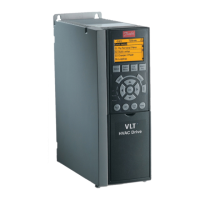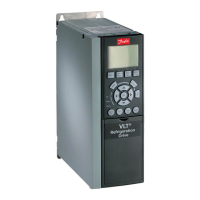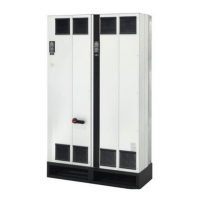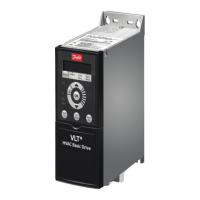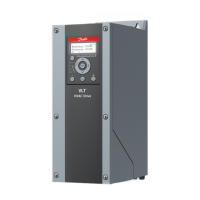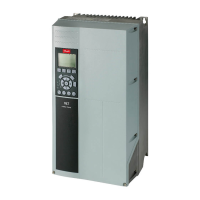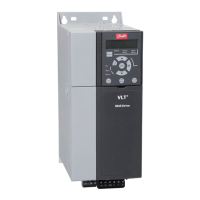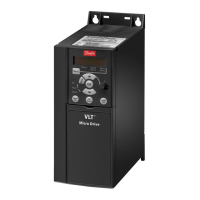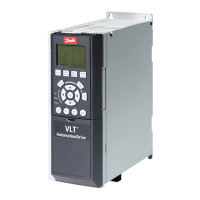It is also possible to measure the value with an
ohmmeter, which will also take the resistance of
the cable into account. Divide the measured
value by 2 and enter the result.
6.
1-37 d-axis Inductance (Ld).
Enter line to common direct axis inductance of
the PM motor.
If only line-line data are available, divide the line-
line value by 2 to achieve the line-common
(starpoint) value.
It is also possible to measure the value with an
inductance meter, which will also take the
inductance of the cable into account. Divide the
measured value by 2 and enter the result.
7.
1-40 Back EMF at 1000 RPM.
Enter line-to-line back EMF of PM Motor at 1,000
RPM mechanical speed (RMS value). Back EMF is
the voltage generated by a PM motor when no
drive is connected and the shaft is turned
externally. Back EMF is normally specified for
nominal motor speed or for 1000 RPM measured
between two lines. If the value is not available for
a motor speed of 1000 RPM, calculate the correct
value as follows: If back EMF is, e.g., 320 V at
1800 RPM, it can be calculated at 1000 RPM as
follows: Back EMF= (Voltage / RPM)*1000 =
(320/1800)*1000 = 178. This is the value that
must be programmed for 1-40 Back EMF at 1000
RPM.
Test Motor Operation
1. Start the motor at low speed (100 to 200 RPM). If
the motor does not turn, check installation,
general programming and motor data.
2.
Check if start function in 1-70 PM Start Mode fits
the application requirements.
Rotor detection
This function is the recommended choice for applications
where the motor starts from standstill, e.g., pumps or
conveyors. On some motors, an acoustic sound is heard
when the impulse is sent out. This does not harm the
motor.
Parking
This function is the recommended choice for applications
where the motor is rotating at slow speed, e.g.,
windmilling in fan applications. 2-06 Parking Current and
2-07 Parking Time can be adjusted. Increase the factory
setting of these parameters for applications with high
inertia.
Start the motor at nominal speed. In case the application
does not run well, check the VVC
plus
PM settings.
Recommendations for different applications can be seen in
Table 3.2.
Application Settings
Low inertia applications
I
Load
/I
Motor
<5
1-17 Voltage filter time const. to be
increased by factor 5 to 10
1-14 Damping Gain should be
reduced
1-66 Min. Current at Low Speed
should be reduced (<100%)
Low inertia applications
50>I
Load
/I
Motor
>5
Keep calculated values
High inertia applications
I
Load
/I
Motor
> 50
1-14 Damping Gain, 1-15 Low Speed
Filter Time Const. and 1-16 High
Speed Filter Time Const. should be
increased
High load at low speed
<30% (rated speed)
1-17 Voltage filter time const. should
be increased
1-66 Min. Current at Low Speed
should be increased (>100% for
longer time can overheat the motor)
Table 3.2 Recommendations for Different Applications
If the motor starts oscillating at a certain speed, increase
1-14 Damping Gain. Increase the value in small steps.
Depending on the motor, a good value for this parameter
can be 10% or 100% higher than the default value.
Starting torque can be adjusted in 1-66 Min. Current at Low
Speed. 100% provides nominal torque as starting torque.
Start-up and Functional Tes... Instruction Manual
MG16E222 Danfoss A/S © Rev. 2014-02-10 All rights reserved. 39
3 3
